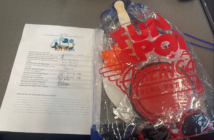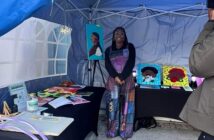By Polina Zadirey, Staff Writer
To tackle complex challenges and drive progress in society, STEM (Science, Technology, Engineering, and Mathematics) fosters ingenuity, analytical reasoning, and technological advancement, and this field has long been dominated by men, such as Bill Gates, Steve Jobs, and Elon Musk.
However, over and over, women are breaking through barriers and establishing a place for themselves in the field. Let us remember some of the trailblazing women in STEM and their significance this Women’s History Month!
Marie Curie (1867-1934) was a pioneering scientist who studied radioactivity in a revolutionary way. She holds the distinction of becoming the first woman to get the Nobel Prize in Physics and the first person to do it in Chemistry, making her an unprecedented figure in the scientific community. Generations of scientists have been and will be inspired by Curie’s work, which has led to breakthroughs in nuclear physics and medicine.

“Marie Curie is my favorite woman in science. She is a Polish scientist whose name was used to name an element, curium! She made a way for other females to science,” said Taliyah Cooper, a sophomore majoring in biomedical and health sciences.
Grace Hooper (1906-1992) was a rear admiral in the United States Navy and made significant contributions to the field of computer science, particularly in programming languages. The first compiler for a programming language, created by Hopper, is widely considered to have been the cornerstone of contemporary computer programming.

Being one of the first female admirals in the United States Navy, she was also a pioneer for women in the military. Over the years of her career, Hopper encountered discrimination, since women were significantly underrepresented in traditionally male-dominated professions such as engineering and computer science.
“When I started working for Saint Leo University, there was only one more woman professor, and there is no big difference right now: we have 3 women math professors, and I am the only female professor in the computer science department,” shared Katrina Weicht, an instructor of computer information system at Saint Leo University.
Katherine Johnson (1918-2020) was an American mathematician. Numerous NASA space missions relied on the calculations of the outstanding mathematician Katherine Johnson, including the historic orbit around Earth performed by John Glenn.

As the first “human computer” in the space program, Johnson was crucial in making sure space trips went well and did not crash. Her significant contributions to space exploration were brought to light in the book and film “Hidden Figures,” which emphasized her accomplishments.
Mae Jemison (born 1956) made a historic achievement in 1992 when she boarded the Space Shuttle Endeavour, becoming the first African American woman to do so. Jemison’s space mission was a watershed moment that encouraged people of all backgrounds to follow her and work in science, technology, engineering, and mathematics. Jemison is a medical doctor, engineer, and champion for scientific education in addition to her space travel achievements.

All these women faced difficulties just because they were women who had an interest in science or mathematics. Fortunately, the barriers of where specific genders belong are wider nowadays, which allows every person to develop in the field they want.
“I always had a fascination with technology because it brings people together,” mentioned Weicht.
Today, resources exist to aid in supporting women in STEM. The 502 Project, for example, offers a platform for women to access mentors and potential jobs!
We should support women who feel like they belong in STEM fields because regardless of gender, if you think it is your strength, and you see yourself in engineering or science, you should be there. That is how our history is made-thanks to people who want to contribute to society and make their dreams come true.





